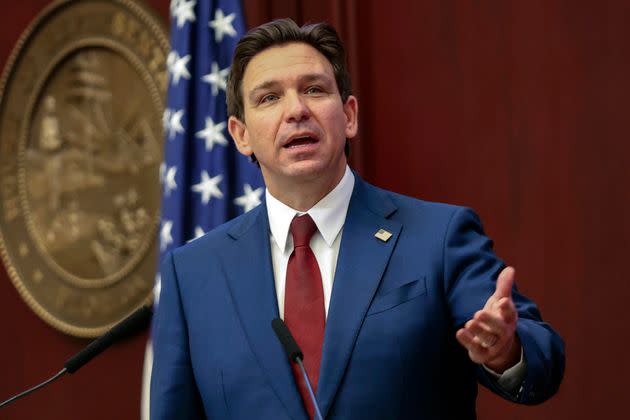Florida’s Ban On Gender-Affirming Care Is Unconstitutional, Judge Rules
Florida’s restrictions on gender-affirming care for minors and adults are unconstitutional, a federal judge ruled Tuesday.
The decision overturns the law banning gender-affirming care for minors, including puberty blockers and hormone therapy, that Republican Gov. Ron DeSantis signed last year.
It also relieves transgender adults of the requirement that patients see a physician in person for any transition-related care, a rule that was particularly burdensome given that most people received care from nurse practitioners and use telehealth appointments.
U.S. District Judge Robert Hinkle in Tallahassee sided with the 11 plaintiffs, including four transgender adults and seven parents of transgender children.
“The State of Florida can regulate as needed but cannot flatly deny transgender individuals safe and effective medical treatment ― treatment with medications routinely provided to others with the state’s full approval so long as the purpose is not to support the patient’s transgender identity,” Hinkle wrote.
The 105-page order in Doe v. Lapado is the first time a federal court has weighed in on the constitutionality of restrictions on gender-affirming care for adults. Last year a federal judge struck down Arkansas’ ban for minors as unconstitutional.
“Gender identity is real. Those whose gender identity does not match their natal sex often suffer gender dysphoria,” wrote Hinkle, a 72-year-old who was nominated by Democratic President Bill Clinton. “Florida has adopted a statute and rules that ban gender-affirming care for minors even when medically appropriate. The ban is unconstitutional.”
The plaintiffs’ challenge, however, did not include the state’s restrictions on gender-affirming surgery, and the state still prohibits those procedures for minors and has some restrictions for adults.
In the order, Hinkle criticized DeSantis and some state legislators who “plainly acted from old-fashioned discriminatory animus” and described the “frenzied rhetoric” of legislators who mischaracterized the kinds of care that transgender people seek as “castration” and “mutilation.”
Hinkle quoted an unnamed state House member who ranted about the dangers of gender-affirming care and falsely described it as doctors “taking little children and they put them to sleep on a gurney. They cut off their breasts. They sever their genitalia. They throw them in the trash.”
Hinkle blasted the state legislators and wrote that this statement is “probably about as far removed from reality as any statement by any legislator ever.”
He instead cited the nearly two dozen American medical associations that support gender-affirming care for minors and adults and wrote that “not a single reputable medical association has taken a contrary position.”
“Transgender opponents are of course free to hold their beliefs. But they are not free to discriminate against transgender individuals just for being transgender,” Hinkle wrote in the ruling. “In time, discrimination against transgender individuals will diminish, just as racism and misogyny have diminished. To paraphrase a civil-rights advocate from an earlier time, the arc of the moral universe is long, but it bends toward justice.”
DeSantis signed the ban after the state medical boards ― filled with DeSantis’ political appointees ― first passed its own rules to ban that care in late 2022. Florida became the first state in the nation to pass such a ban.

The Sunshine State passed six anti-LGBTQ bills in 2022 that included a ban on drag performances and a ban on transgender people using bathrooms in schools and government buildings. Under DeSantis’ helm, Florida enacted a slate of anti-LGBTQ bills amid a record-breaking two years of such legislation in states across the country.
Last June, Hinkle issued a preliminary injunction against the state’s ban for minors, applying only to the three plaintiffs. In the order, he warned that the minors would “suffer irreparable harm” if they were not allowed to access treatment. That same month, he also struck down Florida’s prohibition on Medicaid coverage for treatments for gender dysphoria.
Hinkle has generally ruled in favor of LGBTQ+ rights. In 2014, he ruled that Florida’s 2008 amendment barring same-sex marriage was unconstitutional.
But in the decade after same-sex marriage became federally protected, the right wing has pivoted to attacking transgender people and particularly the rights of transgender minors.
To date, more than 20 states, all of which have Republican-controlled legislatures, have passed bans and restrictions on gender-affirming care for minors, forcing families to make difficult decisions about how to best care for their child. And the courts have thus far issued mixed rulings.
The U.S. Court of Appeals for the 11th Circuit, based in Atlanta, allowed Alabama’s ban to go into effect, and the 6th Circuit, based in Ohio, ruled that Tennessee and Kentucky could enact their bans as well. But other appeals courts have blocked bans on transgender athletes joining teams that correspond with their gender, and the 11th Circuit sided with a Florida drag brunch spot, Hamburger Mary’s, to stop the state’s drag ban from taking place.
In November, LGBTQ+ advocates asked the U.S. Supreme Court to weigh in on Tennessee’s ban on gender-affirming care. The Supreme Court intervened in an Idaho ruling in April, focusing on how the state could enforce its ban on gender-affirming care and for whom.
But neither the Supreme Court nor any U.S. Court of Appeals has yet to weigh in specifically on the constitutionality of restrictions for transition care, Hinkle wrote.
Tuesday’s decision in Florida returns decisions about transgender medical care to the patients and their families, Simone Chriss, an attorney for the plaintiffs in the case and the director of the transgender rights initiative at Southern Legal Counsel, told The Tampa Bay Times.
The ruling “restores some balance in terms of respect and dignity and decency in a state that has never been more in need of those things right now,” Chriss said.

 Yahoo News
Yahoo News 